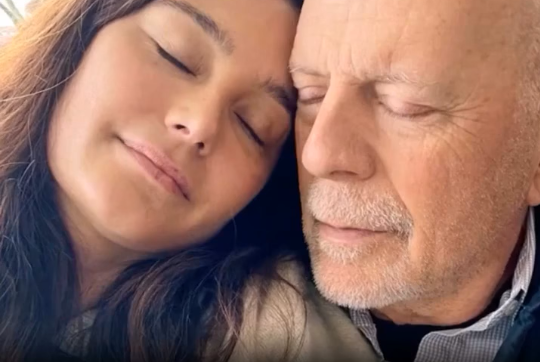Bruce Willis, now 70 years old, has entered a new and deeply emotional chapter of his life. The beloved actor, known worldwide for his powerful performances in films like Die Hard and The Sixth Sense, has been living with frontotemporal dementia—a cruel and degenerative condition that slowly robs a person of their ability to communicate and understand the world around them. Recently, Bruce’s wife, Emma Heming Willis, 47, shared in a heartfelt ABC interview that he has moved into a specialized care home near their family residence. It was, she admitted, “one of the hardest decisions” she has ever had to make, yet one she firmly believes Bruce himself would have supported, knowing that it was best for their daughters, Mabel, 13, and Evelyn, 11.
The transition was not easy. For months, Emma had tried to manage his care at home with the help of professional nurses, but as Bruce’s condition worsened, it became clear that he needed a facility with round-the-clock supervision and expert neurological support. The move, though heartbreaking, brought a certain peace of mind to the family. The care home is not a sterile or lonely environment—it is a warm, sunlit place filled with compassion, laughter, and routine. The staff have come to love Bruce not as a celebrity, but as the gentle, funny, and kind man he still is beneath the illness.
Emma spoke candidly about the emotional toll of the decision, describing how she spent countless sleepless nights wondering if she was doing the right thing. “You never think you’ll be in this situation,” she said softly. “But when you love someone, truly love them, you realize that care sometimes means letting go of what you need—and doing what’s best for them.” She emphasized that their daughters visit him as often as possible. They share family meals in the facility’s garden, watch old movies together—sometimes even ones starring Bruce himself—and play little games that still make him smile. Those visits, she said, “remind him that he is surrounded by love, no matter what his mind may forget.”
Though Bruce’s physical health remains relatively strong—he walks daily, enjoys the sunlight, and sometimes hums tunes from old jazz records—his ability to speak is slipping away. “It’s just his brain that’s failing him,” Emma revealed through tears. “The language is disappearing. Sometimes he tries to say something and the words just won’t come. But he looks at us, and we know what he means. There’s a different kind of conversation now—through touch, through eyes, through smiles.” This new form of communication, while wordless, has deepened their bond in unexpected ways.
Friends and loved ones frequently stop by the facility to spend time with Bruce, ensuring he never feels isolated. Former co-stars and longtime companions have described their visits as “bittersweet”—filled with both nostalgia and gratitude. They bring photos, music, and even old scripts that spark flickers of recognition. “There are moments,” Emma said, “where he’ll laugh suddenly at a line, or react to a familiar face, and in that instant, it feels like he’s still him—the man we all know.”
Despite the devastating nature of frontotemporal dementia, Emma has chosen to focus on gratitude rather than grief. She said that while the disease continues to take pieces of Bruce away, it has also given their family a new perspective on love, patience, and presence. “We’ve learned to live in the moment,” she explained. “We don’t dwell on what he can’t do anymore—we celebrate what he can still feel. Love, warmth, music, laughter—those things haven’t disappeared.”
Their daughters, still young but wise beyond their years, have adapted to this new version of family life with grace and empathy. Mabel often reads aloud to her father, while Evelyn loves to hold his hand during their walks. Emma said both girls have become “his greatest joy and his strongest connection to the world.” Through them, Bruce continues to experience the beauty of everyday life—the sound of their laughter, the softness of their hugs, the comfort of familiar love.
Emma also expressed gratitude for the support network surrounding her family. Friends, fans, and even strangers from across the world have reached out with letters, messages, and prayers. “It means more than people realize,” she said. “Knowing that so many care about Bruce—it gives us strength. He may not be able to read their words anymore, but their love reaches him.”
Today, Bruce Willis’s story is not just one of fame or decline—it is one of enduring humanity. It is a reminder that even as memory fades and words disappear, love remains—silent but eternal. His care home is not a place of endings, but of continued connection. Each visit, each shared meal, each quiet moment of laughter reminds his family that the essence of Bruce—his heart, his kindness, his spirit—still shines through.
As Emma put it beautifully at the end of her interview: “He may not remember everything, but we remember for him. And that’s enough. Because love doesn’t vanish. It adapts. It survives.”
Bruce Willis’s journey, now guided by tenderness and faith, stands as a testament to the power of family, compassion, and the resilience of the human spirit. Though the world knew him as an action hero, his greatest strength has always been the love he gives—and the love that continues to surround him.
